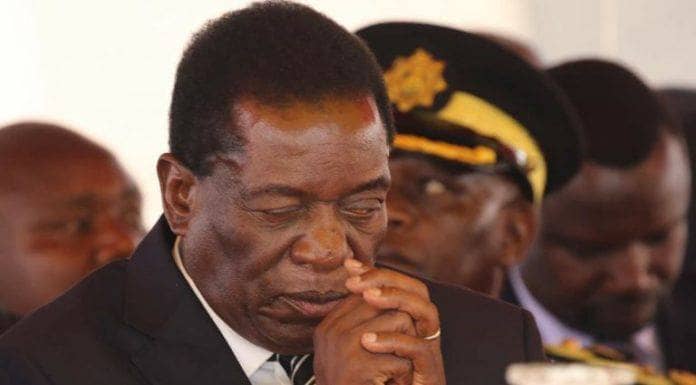Jittery Mnangagwa clears streets ahead of planned protests

President Mnangagwa,
By Philemon Bulawayo and MacDonald Dzirutwe
HARARE — Jittery Zimbabwean President Emmerson Mnangagwa yesterday ordered security forces to clear the streets of the capital Harare and major cities in the troubled southern African country ahead of planned anti-government protests today.

Mnangagwa has struggled to keep his promise to revive the economy, with many Zimbabweans complaining they are worse off than when he replaced the autocratic Robert Mugabe after an army coup in 2017.
Activists called for street rallies today against corruption in government and economic hardships including soaring inflation that has eroded salaries and pensions.
In the capital Harare and second city of Bulawayo armed soldiers and anti-riot police patrolled on foot and in trucks, telling people to leave, while checkpoints blocked roads into the central business districts.
“Why are they forcing shops to close before the stipulated time?” asked one nervous motorist in Harare, asking not to be named.
After midday, downtown Harare and Bulawayo were largely empty. In Gweru and Masvingo, vehicles were being turned away from entering the CBD.
On Wednesday, Mnangagwa said today’s protest would constitute an “insurrection” by the opposition.
A police statement said no demonstrations would be allowed today. “All security arms of government are on full alert and will deal decisively with any individuals or groups fomenting violence and sending threats or provocative messages through the social media or any other means,” it said.
Soldiers manned checkpoints on roads leading into the city centre, with vehicles turned back.
Critics say Mnangagwa, like other authoritarian leaders round the world, is exploiting the coronavirus lockdown to stifle dissent.
Police last week arrested Jacob Ngarivhume, the main organiser of today’s protest and journalist Hopewell Chin’ono, accusing them of inciting violence by agitating for the protests on Twitter.
The two men deny the charges and have been in custody until next week when they will appear in court again.
Yesterday, police in Bulawayo raided the home of journalist Mduduzi Mathuthu in connection with suspected possession of fliers to be used in today’s protests. When they failed to find him, they arrested his sister as bait.
Mathuthu confirmed from his hideout, they had taken his sister.
“So they raided my house, found me absent and they gave my sister an ultimatum: get Mduduzi here, or we will take you. They took her. She has no journalistic or political bone on her. Please stop this madness,” he tweeted last night.
Meanwhile, senior doctors at government hospitals stopped work yesterday over poor conditions, joining thousands of nurses who quit work last month to press for US dollar salaries.
Seven babies were stillborn in one night at Harare Central Hospital on Monday because their mothers did not get adequate medical care due to the nurses’ strike.
In another development, the World Food Programme yesterday appealed for an additional US$250 million to provide relief to millions of Zimbabweans and warned 60 percent of the population could become “food-insecure” by December.
Zimbabwe is gripped by an economic crisis, its worst in more than a decade, which has seen shortages of foreign currency, medicines and soaring inflation.
The WFP said the number of food-insecure Zimbabweans will reach 8,6 million by year end, which is 60 percent of the population.
The agency requires an additional US$250 million to support a rapidly expanding emergency operation. In April, the WFP sought US$130 million to fund emergency operations until next month.
“Many Zimbabwean families are suffering ravages of acute hunger, and their plight will get worse before it gets better,” Lola Castro, WFP’s regional director for Southern Africa, said.
“We need the international community to step up now to help us prevent a humanitarian catastrophe.”
The WFP said a national lockdown is causing more job losses while rural hunger is rising as unemployed citizens return to their village homes. — Reuters-ZimLive.






